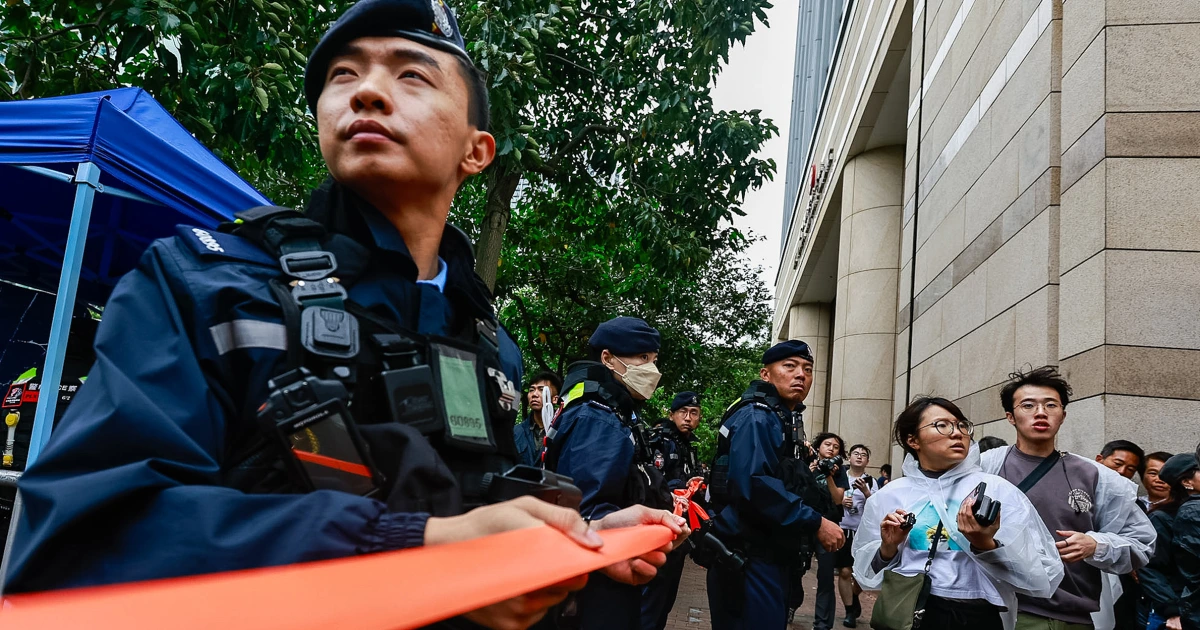Taipei, Taiwan – A Hong Kong court handed out a sentence on Monday against a leading pro-democracy advocate for 10 years and dozens of other activists to years-long jail terms in the Chinese territory’s most significant national security case.
The 60-year-old lawyer, Benny Tai, a significant figure in Hong Kong’s pro-democracy protests in 2014 and 2019, received a lengthy sentence on Tuesday after prosecutors cast him as the “organizer” of a conspiracy by activists and politicians dating back to July 2020. Tai and 44 others pleaded guilty to or were convicted of offenses over organizing an unofficial primary election to select pro-democracy candidates for the city’s legislature.
The activists hope that by electing lawmakers who would vote down the city’s budget, they will force the dissolution of the legislature and then the ouster of the city’s leader—something allowed for under Hong Kong’s Basic Law. Prosecutors allege the group aimed to “overthrow” the government. Many of the group had spent years in remand, and they were denied bail during a marathon hearing in March 2021.
Among the 47 defendants arrested by Hong Kong’s national security police in a predawn raid in January 2021, 31 pleaded guilty – including Tai. In May, the court convicted 14 of the remaining activists of subversion and acquitted two others, former district councilors Laurence Lau and Lee Yue-shu.
The trial, which covered 118 days since its intended start had been repeatedly postponed, was presided over by three handpicked judges and denied many of Hong Kong’s standard law system conventions, such as the right to a jury and presumed right to bail.
More:Hezbollah Leader Killed In Israeli Attack on Beirut
Those who pleaded guilty were given shorter terms. They included former journalist and legislator Claudia Mo, 67, who got four years and two months in jail. Other well-known activists received prison sentences, including Joshua Wong, 27, whose sentence was four years and eight months. Second longest sentence: Owen Chow, 27, was given seven years and nine months for being a candidate in the election.
Former journalist Gwyneth Ho, 34, was sentenced to seven years. Both defendants pleaded not guilty in court. Australian citizen Gordon Ng, who published on social media and in the media his calls to Hong Kongers to vote in the primary, was sentenced to seven years and three months. Observers say prosecutors will appeal the sentence for at least some of the activists, and Tai and Wong could well be on that list.
Defendants charged under Hong Kong’s national security laws enacted in 2020 who are labeled “primary offenders” face life imprisonment. Lower-level offenders face sentences between three and 10 years.
As the sentences rolled in on Tuesday, it was an emotional moment for Kevin Yam, a former Hong Kong lawyer who is now based in Australia. In his career in Hong Kong, he knew or had encountered many of the 45 defendants at the hearings, including Tai, for whom city authorities have wanted him for alleged national security offenses.
“I’ve known [Tai] for over 20 years, and the thought of him going in for 10 years is heavy,” Yam told Al Jazeera.”One day is too heavy. I mean, what has he done? He’s organized an informal vote on something. All 45 of the people convicted are being punished for seeking to work within the constitutional process.”
The rulings also sparked instant condemnation from foreign governments and rights groups. Running in an election and trying to win it is now a crime that can lead to a decade in prison in Hong Kong,” said Maya Wang, associate China director at Human Rights Watch.
“Today’s harsh sentences against dozens of prominent democracy activists reflect just how fast Hong Kong’s civil liberties and judicial independence have nosedived in the past four years since the Chinese government imposed the draconian National Security Law on the city.” Australian Foreign Minister Penny Wong told the media on Tuesday that Canberra had lodged a complaint with the Hong Kong and Chinese authorities over the sentencing of Ng.
Australia has made clear our strong objections to the Chinese and Hong Kong authorities’ continuing broad application of national security legislation, including to Australian citizens,” Wong said. The United States consulate in the city said it “strongly condemns” the sentences.
Hong Kong was roiled in 2019 by sometimes violent anti-government protests after then-leader Carrie Lam proposed legal changes to allow criminal suspects to be extradited to mainland China.
Protests quickly became the most significant anti-government movement on Chinese soil since 1989’s Tiananmen Square protests. Hong Kong residents demanded greater political freedoms, including direct elections to choose the city’s leader.
In 2020, Beijing imposed sweeping national security legislation on the city, criminalizing secession, terrorism, subversion, and collusion with foreign forces. Earlier this year, Hong Kong passed local and national security legislation based on “Article 23” of the city’s mini-constitution, introducing a range of new offenses, including theft of state secrets and treason.
According to a count by the Georgetown Center for Asia Law, between July 2020 and December 31, 2023, national security police detained 286 people under the city’s national security law or its colonial-era sedition laws. So far, 156 of those people have been charged, including the so-called Hong Kong 47.















